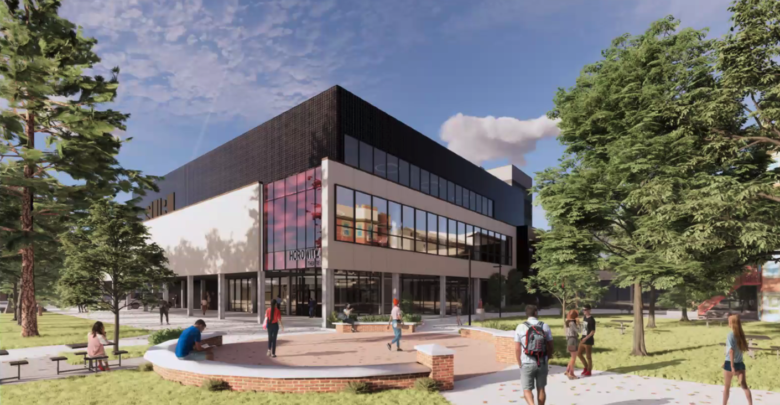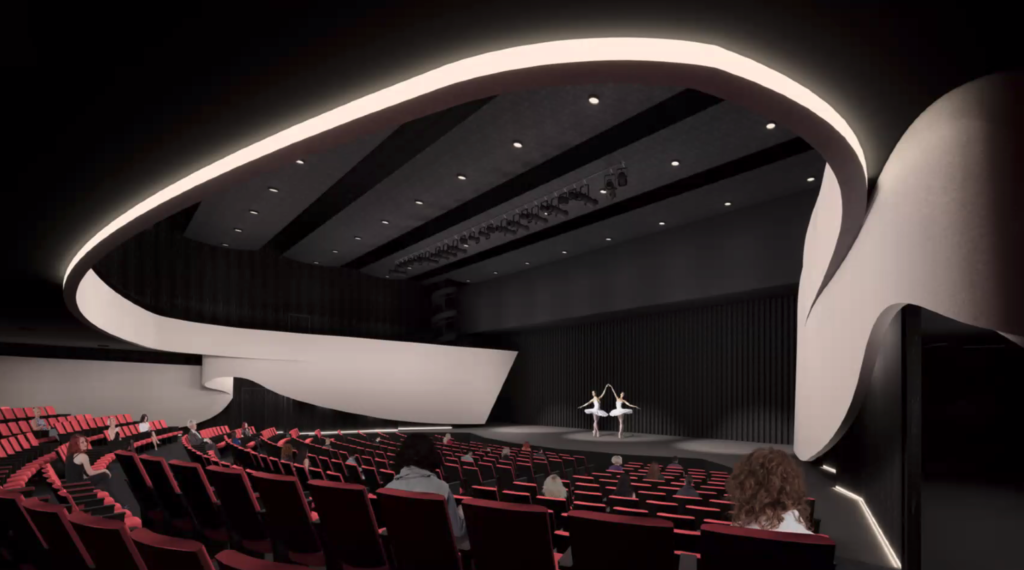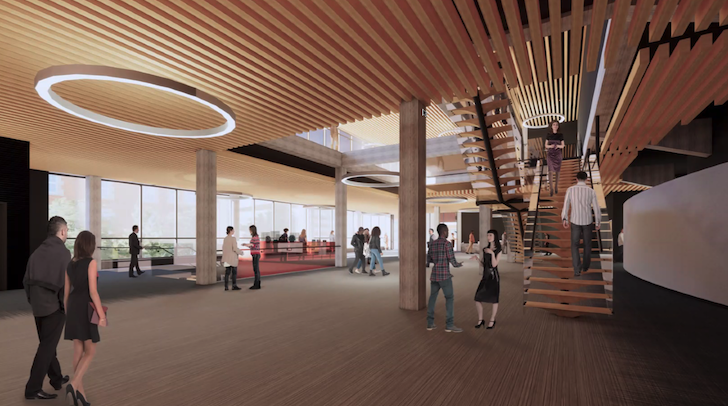Myer Horowitz renovation could be complete by 2022, plans include accessibility updates and gender neutral washrooms
Marc Dumouchel, the general manager of the Students’ Union, gave a presentation during council on November 24 explaining the budget, timeline, and new features of a renovated Myer Horowitz theatre.
 Rachel Narvey
Rachel NarveyUnused for the duration of the COVID-19 pandemic, the Myer Horowitz theatre might be completely made over by the time campus events make a full comeback.
Marc Dumouchel, the general manager of the Students’ Union, presented a detailed design plan of the renovated Myer Horowitz theatre during a November 24 Students’ Council meeting. The presentation discussed its projected budget of $17.5 million, including renovations to surrounding spaces in the Students’ Union valued at $3 million. Students’ Council will vote on whether to approve the renovation at a council meeting on December 1.
“We will have the hottest thing in the city for at least the next five or 10 years,” Dumouchel said.
The Myer Horowitz renovation project intends to capitalize on the building’s emptiness as a result of the pandemic, amping up construction with the expectation that campus life won’t fully return in 2021-22.
“We expect the entertainment and events market to come back more gradually next year, but really explode in 2022,” Dumouchel said. “Our hard deadline is to get this theatre open September 2022.”

Myer Horowitz renovation will include accessibility improvements
Erin Van-Horn, the Students’ Union building planner, gave a brief presentation on the new features that will accompany the renovation.
“We’re making a concerted effort to improve the access both in the circulation within the theatre and the main floor of SUB,” she said.
The renovation will include a new elevator which will connect to the lower level, main floor, and second floor of SUB. Additionally, there will be new flooring in the main floor vestibule areas to fix the issue of vestibule matting being difficult to navigate for those who use wheelchairs.
Within the theatre, there will be additional accessibility features like:
- Improved seating so that guests with low-mobility now have middle and central seating options
- Increased access to change rooms and backstage space for performers with low-mobility
- Closed captioning for theatre patrons who are deaf
- Lights with a wavelength specifically designed to accommodate those with low vision
The Myer Horowitz renovation will also include gender-neutral restrooms on the second floor of the theatre, with an additional gender neutral washroom on the main floor of SUB close to the main quad entrance.
“To have that be the first impression within SUB, that we are a place of inclusivity and gender neutrality I think is a great step forward for our organization,” Van-Horn said.

Clarifications on the Sustainability and Capital Fund
The theatre renovation will be partly funded by the Sustainability and Capital Fund (SCF), an initiative that was put forward in a referendum during Winter 2020, which asked students to pay $25 a semester for projects to be decided in the future by council.
Karl Buchanan, a law councillor, asked if Dumouchel could comment on the risk to general membership fees, the $52.99 fee U of A students pay annually towards the Students’ Union, if the SCF fee wasn’t renewed through a vote in five years.
Dumouchel clarified that there will not be a referendum on the fee in five years, rather a review of it, the format of which will be determined by council at the time.
“We need the review to ensure that the Students’ Union could be held accountable,” he said. “That being said, it has always been the case that should the Students’ Union engage in a long term financing arrangement … council would be limited in cutting it back by the nature of our financing agreement.”
While the SCF will account for some of the project’s financing, some of the budget will be supplemented from grants and donations.
Plans to improve theatre access for student groups
Throughout the presentation, there was an emphasis on a long-term goal of improving student group access to the Myer Horowitz theatre.
Brennan Murphy, the director of conferencing and events for the Horowitz Centre, noted that student ability to use the theatre has been a long term issue.
“Historically the theatre has been quite hard for student groups to break into,” Murphy said. “I think that we can put resources into making it a lot easier for student groups [to hold events at the theatre].”
According to numbers shared by Dumouchel, in both 2018 and 2019 student events at the Myer Horowitz totalled about a third of all events.
When asked in an interview with The Gateway why student groups would book the theatre at a time where other affordable and free options are available on campus, Dumouchel said that new models are in the works that will “greatly reduce or eliminate” the risk for student groups getting involved.
“If a group wants to bring in a speaker but doesn’t want to commit to the rent, maybe we can find a way where they help us book it and promote it, but we take care of the costs,” he said.
Dumouchel emphasized the theatre would revitalize what he described as a waning sense of campus community.
“The culture has changed,” Dumouchel said. “People’s behaviour has changed. … People get caught up in their own little groups. One of the great things about a place like the theatre is that it allows us to do things that can bring different people together.”
Amlan Bose, an engineering councillor, asked why the Myer Horowitz should be maintained when there are currently two other theatres on campus, like the Timm’s Centre for the Arts and Convocation Hall.
“We have considered that,” Dumouchel said. “But the size of your theatre and the layout of your theatre has a great impact on what you can do. Convocation Hall has a lot of benefits but it isn’t a truly multi-purpose space in the same way our theatre is. The Timm’s Centre is a lot smaller and not a publicly accessible theatre.”
“This theatre is different because it’s run by students. We redo the theatre, you can have skit night here, you can have Med Show here … I think SUB and the theatre can play a key role in helping to rebuild and strengthen campus community and culture.”




